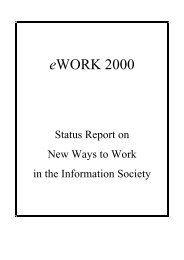Proceedings of 8th European Assembly on telework (Telework2001)
Proceedings of 8th European Assembly on telework (Telework2001)
Proceedings of 8th European Assembly on telework (Telework2001)
Create successful ePaper yourself
Turn your PDF publications into a flip-book with our unique Google optimized e-Paper software.
233The paper <str<strong>on</strong>g>of</str<strong>on</strong>g> Shiri Ahuja, “Functi<strong>on</strong>al Integrati<strong>on</strong> Through Alternative Officing: ParticipativeStrategies for Creating Suitable Structures” discusses the role and importance <str<strong>on</strong>g>of</str<strong>on</strong>g> flexible <str<strong>on</strong>g>of</str<strong>on</strong>g>ficesoluti<strong>on</strong>s for firm performance. She too stresses the importance <str<strong>on</strong>g>of</str<strong>on</strong>g> participative design even as itcomes to <strong>telework</strong> and <str<strong>on</strong>g>of</str<strong>on</strong>g>fice soluti<strong>on</strong>s.Chrystal Fult<strong>on</strong> discusses in her paper “Organizati<strong>on</strong>s, Home-based eWorkers, and the Provisi<strong>on</strong><str<strong>on</strong>g>of</str<strong>on</strong>g> Work Tools in the eWorkplace” the distributi<strong>on</strong> <str<strong>on</strong>g>of</str<strong>on</strong>g> resp<strong>on</strong>sibilities between employers andemployees <str<strong>on</strong>g>of</str<strong>on</strong>g> keeping technical infrastructure available for <strong>telework</strong>ers. A sec<strong>on</strong>d paper byChrystal Fult<strong>on</strong> co-authored by Edward Halpin and Steve Walker, titled “Privacy Meets HomebasedeWork” discusses the sensitive area <str<strong>on</strong>g>of</str<strong>on</strong>g> privacy and m<strong>on</strong>itoring in homework. At home, aboundary between the private and public spheres must be drawn.Mayumi Hori in her paper “The Development <str<strong>on</strong>g>of</str<strong>on</strong>g> IT and a New Work Format for Women in Japan”sees <strong>telework</strong> as a means to emancipate Japanese women. Through a rich statistical analysis sheshows that positive trends are already visible, but notes too that a lot still remains to be d<strong>on</strong>e.Jeanne Jimenez, with the paper “Surveillance in a C<strong>on</strong>text <str<strong>on</strong>g>of</str<strong>on</strong>g> Remote Work: the Janus Syndrome,from Trust to Electr<strong>on</strong>ic C<strong>on</strong>trol”, brings up the topic <str<strong>on</strong>g>of</str<strong>on</strong>g> electr<strong>on</strong>ic surveillance <str<strong>on</strong>g>of</str<strong>on</strong>g> <strong>telework</strong>ers.Trust and electr<strong>on</strong>ic surveillance support each other, and the management <str<strong>on</strong>g>of</str<strong>on</strong>g> <strong>telework</strong> should bebased <strong>on</strong> a deliberate balance between them, to be worked out case by case.Maarit Laht<strong>on</strong>en c<strong>on</strong>tributes the paper “Development <str<strong>on</strong>g>of</str<strong>on</strong>g> Intergroup Cooperati<strong>on</strong> with Acti<strong>on</strong>Research”. In this methodologically-oriented paper, she discusses through cases possibilities tosupport and develop inter-group co-operati<strong>on</strong>.Beverly and Owen Leeds, in their paper “Trusting Teleworkers” present a c<strong>on</strong>ceptual model<str<strong>on</strong>g>of</str<strong>on</strong>g> trust in <strong>telework</strong> situati<strong>on</strong>s. They differentiate between four types <str<strong>on</strong>g>of</str<strong>on</strong>g> trust: calculative,c<strong>on</strong>tractual, valuebased and system trust. All <str<strong>on</strong>g>of</str<strong>on</strong>g> these can and should be used to support <strong>telework</strong>arrangements.Anita Lundin and Birgitta Perss<strong>on</strong> presented the paper “Implementati<strong>on</strong> <str<strong>on</strong>g>of</str<strong>on</strong>g> Trust-based Strategiesand Structures in the Organisati<strong>on</strong>al C<strong>on</strong>text”. They underline that organizati<strong>on</strong>al arrangementsmust support <strong>telework</strong>er motivati<strong>on</strong> and participati<strong>on</strong>. Only through that will the employing firmtoo benefit.The group Anna Moberg, Birger Rapp, Charlotte Stolz and Carl-Johan Petri c<strong>on</strong>tributed twopapers. In the paper “How Can One Minus One Equal Three” they study the Swedish area <str<strong>on</strong>g>of</str<strong>on</strong>g>Ljusdal, and search for the success factors <str<strong>on</strong>g>of</str<strong>on</strong>g> this area in its introducti<strong>on</strong> <str<strong>on</strong>g>of</str<strong>on</strong>g> telecenters to the area.The sec<strong>on</strong>d paper, “Managing Geographically Dispersed Data Acquisiti<strong>on</strong>” discusses the difficulties<str<strong>on</strong>g>of</str<strong>on</strong>g> acquiring company and process data to central databases. Often a mandatory data inputrequirement is needed, as in the case DHL presented in the paper.Mikko Ruoh<strong>on</strong>en, in his article “Knowledge Networks in Informati<strong>on</strong> Industries – Implicati<strong>on</strong>sto Knowledge Work Management Practices” discusses management challenges in modernorganizati<strong>on</strong>s, where knowledge creating and capturing are essential key functi<strong>on</strong>s.








